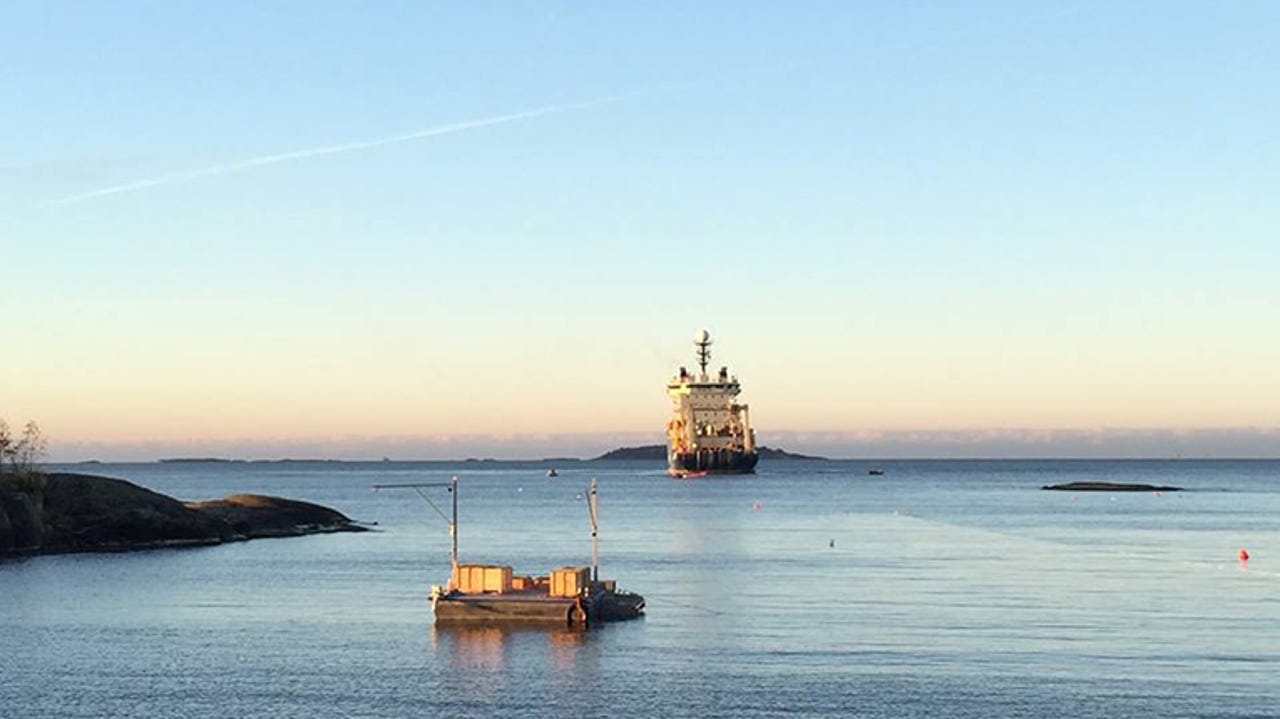Helsinki to Frankfurt in 20 milliseconds: The Baltic cable that's breaking data speed records


Cinia has finished laying the new Baltic fiber-optic subsea cable linking Finland and Germany.
Finland's aspirations to become a global data hub have been boosted with the launch of a new high-speed submarine data cable connecting the Nordic country directly with Germany.
The 1,172km fiber-optic cable system is called C-Lion1 and also dubbed Northern Digital Highway. It runs between Helsinki and Rostock, buried one metre into the Baltic seabed. The cable joins existing terrestrial networks in both countries to improve capacity and latency.
"We have the largest capacity connection in the world at the moment," says Jukka-Pekka Joensuu, executive vice president at Cinia Group, the primarily Finnish state-owned company behind the venture.
In the latest tests, the cable, which consists of eight fiber pairs, has achieved a theoretical transmission capacity of 144Tbps. That figure is about 20 percent greater than anticipated when the construction was started in 2015 with infrastructure supplier Alcatel-Lucent Submarine Networks, now part of Finland's Nokia.
"The theoretical capacity of one fiber pair is 18Tbps when originally it was anticipated to be 15Tbps," Joensuu says. "This means one fiber pair could transmit most of the Nordic data traffic at the moment."
In practice, the data cable could enable everybody in Finland's 5.5 million population to access a 25Mbps connection simultaneously.
According to Cinia, the new fiber-optic link will cut the round-trip delay from Finland to Central Europe to less than 20 milliseconds. In addition, it will free Finland from relying on a single connection through Sweden and Denmark for its international data transmission and potential snooping from Swedish authorities.
The Finnish state has been the main force in making the €100m ($111.5m) submarine data cable happen. It has invested €20m ($22.3m) in the project, which has been matched by institutional investors Ilmarinen and OP Financial Group.
The government believes the new data connection will help boost Finland's digital business and increase interest from datacenter operators.
At the cable's opening event, the then Finland European affairs and foreign trade ministerLenita Toivakka said the new link provides significant opportunities for business growth, particularly for cloud service providers and related businesses.
"It means better possibilities to develop further digitalization in Finland. It means that the datacenters in Nordic countries become more attractive," she said.
Brigitte Zypries, parliamentary state secretary at the German federal ministry for economic affairs and energy, also looked at international benefits: "The new submarine data cable is an opportunity not only for businesses in Finland and Germany but also the whole of Europe."
A prime example of the type of investments Finland hopes to attract is the datacenter that German web-hosting company Hetzner Online has decided to build in the country. Hetzner has invested €10m in C-Lion 1 to secure the right to use one of the fiber pairs.
Cinia has also struck major deals with mobile operator Sonera, datacenter provider Equinix, as well as Russian telecoms company Avelacom, which all look to benefit from fast connections between Northern and Central Europe.
"With the full implementation of this project, we'll be able to introduce some more ultra-low latency routes between key financial hubs in Europe and Asia, plus reduce latency on some of the existing routes, for example between London and Moscow," Avelacom global business director Aleksey Larichev says.
Cinia sees the sea cable as only the first step in connecting Europe and Asia. Notably, Finland is promoting the Arctic Connect Cable initiative, which would bring the two continents closer, with a 14,900km submarine data cable running through the Northeast Passage.
Despite ongoing discussions, that project still lacks concrete plans, not least because of its €800m estimated price tag and the involvement of multiple countries. But Cinia Group's Joensuu believes it is only a matter of time before it happens.
"The amount of data, and everybody's dependency on good connections, will only grow. There's a need to build new digital infrastructure. This means that the connection between Asia and Europe will need to improve," Joensuu says.